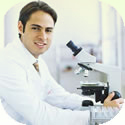Careers in Science
 |
Careers in Science
"Science" is a word derived from the Latin "scientia" which means "knowledge". The Latin verb "scire" means "to know".
|
Science Defined
Science Fair Project defines science as follows:
Science is the study of the material world using human reason. The scientific method is the way human reason and logic are deductively applied to the material world to gain knowledge. It is a tool. Like most tools, it has both strengths and weaknesses. Since we live in a society dominated by science, it is important for us to understand the methods, processes, possibilities and limits of science. We do not have to become specialists to do this, but it sure helps to have some first hand experience using the scientific method.
Science, by definition, limits itself to what can be observed, measured and verified. It is an appropriate tool for answering certain types of questions, but an inappropriate method for answering others.
The scientific method cannot, for example, be used to find the answers to questions like "Does X love me?" or "Why does the giraffe have a long neck?". The reason is that feelings and meaning cannot be measured. However, "What are the evolutionary advantages the giraffe gains through having a long neck?" is a valid question.
Learning To Be A Scientist
Here are a few of the skills and characteristics of the scientist:
- Solves math problems
- Thinks abstractly
- Comprehends scientific theories
- Able to complete complex calculations
- Can use a microscope or computer
- Analyzes data
- Interprets formulas
- Able to conduct experiments
- Examines and explores a variety of ideas
- Able to work independently
- Observant
- Inquisitive
Science education today has become very specialized, especially at the mater's and doctorate degree levels. However, specialization can begin at the associate and baccalaureate degree levels.
Fields of Study
Some of the fields of science that may be studied include:
- Actuarial and statistical sciences
- Agriculture
- Astronomy
- Atmospheric science
- Aviation science
- Biochemistry
- Biology
- Botany
- Chemistry
- Fire science
- Forestry
- Geology
- Geophysics
- Mathematics
- Microbiology
- Oceanography
- Physics
- Zoology
Science Education and Life-Long Learning
When you investigate science degree and certificate programs, consider the following points when choosing which college or university to attend:
- The degree program should be state accredited. Learn more about accreditation.
- Speak with admissions counsellors to determine the flexibility of the programs offered. For example, can you study a wide range of courses in your first and second years and then create a major and a minor in your third and fourth years? Maybe you wish to structure a major in your second year?
- What works best for you? Taking two years of college and then transferring to a four-year program? Or would you prefer four years at the same school?
- Does the school offer career services that include job placement, a resume service, job fairs and networking opportunities? Is there a fee connected with the career services offered? What is the placement rate for graduates of the program?
- Are you able to attend school full-time or part-time? Evenings or weekends only? Have you considered online or distance learning. Online learning resources.
- What is the cost of the education required? Will you require financial aid? Could you qualify for a scholarship? Are loans or grants available to you? Financial aid resources.
No matter what piques your interest, the field of science offers many options to students.
- Get Started: Visit the links on the left navigation bar to review current career information and learn more about the nature of the jobs that interest you, such as salary expectations, working conditions, future outlook of the profession, employment rates and educational requirements.
|